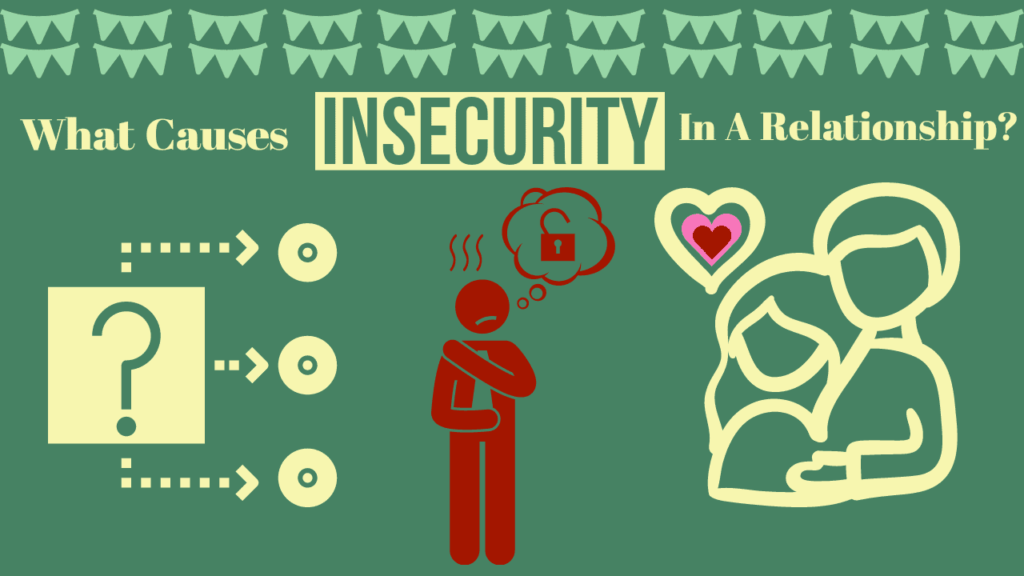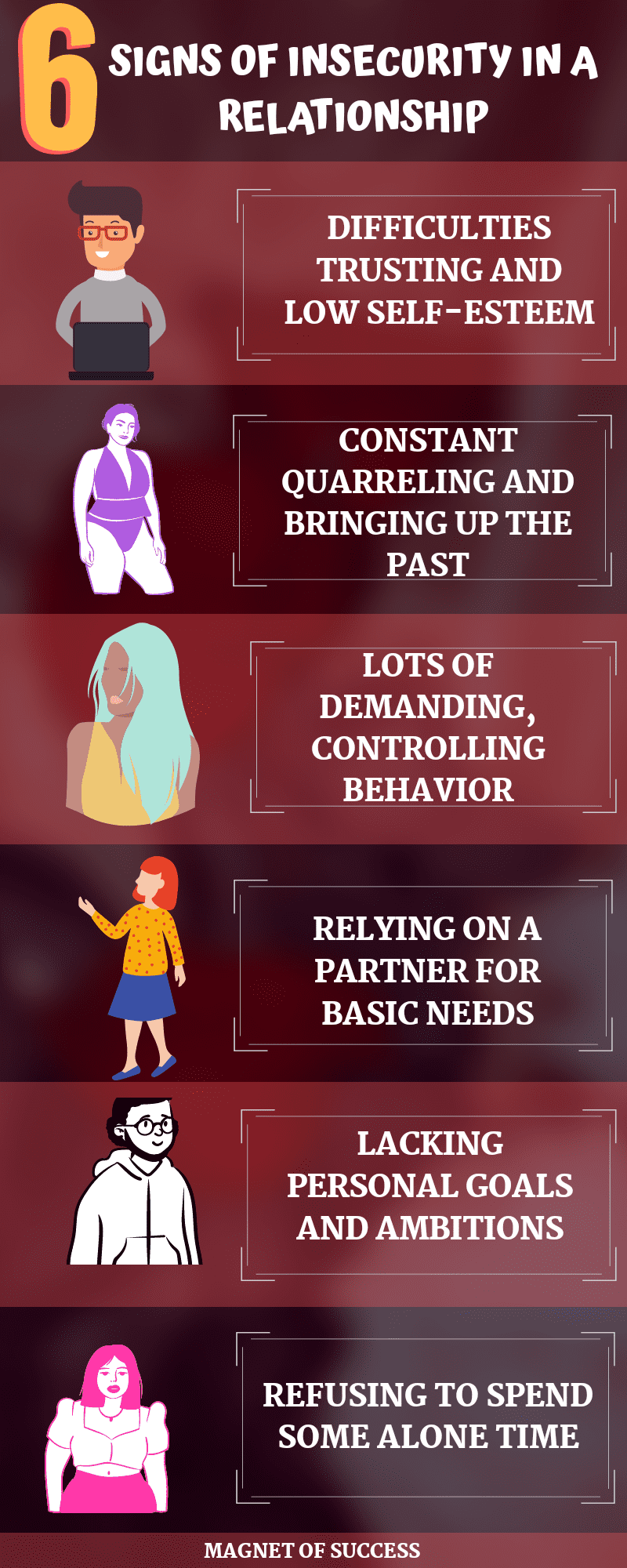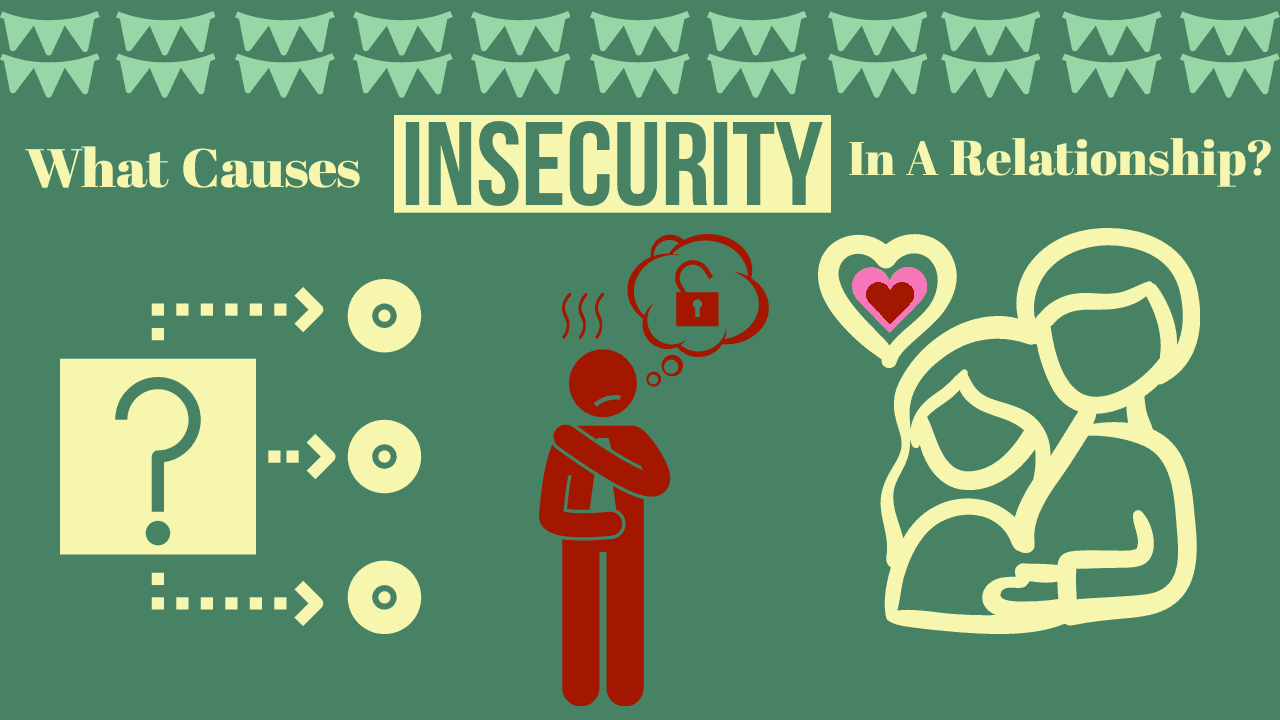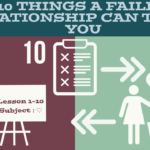Insecurity in a relationship is caused by one of two factors.
Either the insecure person in the relationship has low confidence and low self-esteem because of something that’s happened in the past (bad parenting, unhealthy relationships, trauma, etc.), or because the insecure person’s partner is doing something trust-breaking that conflicts with the insecure person’s fears or anxiety.
Most of the time, it’s a mixture of both.
The insecure person went through something traumatic in the past; for example, got cheated on—and the secure person happens to be impatient and lacks relationship knowledge and understanding.
This fundamental lack of mutual understanding in a relationship typically causes the insecure person to cling onto his or her secure partner for dear life and throws the relationship off balance.
It makes it one-sided as it smotheres the secure person and hurts the less secure one.
If you’re trying to figure out what causes insecurity in a relationship, this article will help you with it. It will tell you what causes insecurity, and how to overcome it.


What causes insecurity in a relationship?
Low self-esteem and insecurity in a relationship stem either from the past or directly from your romantic partner.
They’re caused by:
- High or higher relationship expectations (different wants and needs).
- Poor understanding of relationships, your partner, and yourself.
- A lack of maturity and personal strength.
- Misinterpretations of your partner’s intentions, love language, speaking/behaving habits.
- Anxiety from previous relationships, upbringing, or something that makes you apprehensive/unsure about the future.
- Emotional, physical, financial overdependence.
- Unmet basic relationship needs.
- Poor or mediocre partner behavior.
In other words, anxiety and insecurity in a relationship are typically caused by your lack of self-investment or by your partner’s inconsiderate words and actions.
To tell whether you need to grow more as a person, go through the following 7 questions.
The answer to these questions will help you realize if you’ve been slacking off in the personal development department and if you now need to try a bit harder.
- Do I appreciate my own company or do I need a person by my side to feel fulfilled and good about myself?
- Does my partner’s absence make me feel anxious?
- What do I think about myself? Do I have lots of insecurities and fears that I need to overcome? Do I possess the strength to deal with problems on my own?
- Are my partner and I equal partners or is my relationship imbalanced in terms of emotional investment? If it is, is there something I can do to make it better? What do people with an unbiased opinion think about the quality of my relationship?
- Do I trust my romantic partner or am I afraid that my partner will leave? Am I walking on eggshells around my partner?
- Does my relationship bring out the worst in me?
- What’s my self-control like when things get heated?
To figure out if your partner is the one who makes you insecure in a relationship, however, carefully answer the next questions:
- Does my partner have my best interest at heart? Does he or she understand my problems, sympathize with me, listen to me, provide support, and respect me?
- Does my partner handle arguments and misunderstandings well?
- Is my partner doing anything that makes me anxious? Something like drinking, gambling, or talking to an ex while in a relationship with me?
- Is he or she fulfilling my relationship needs/expectations and paying enough attention to me?
- Does my partner encourage my personal growth?
- Does he or she willingly talk about the future and often reassure me that we’re on the same path?
Puzzle out if your partner makes you feel insecure in a relationship or if you’re insecure because of something or someone from the past.
Whether your partner is responsible for your insecurity or if you’re the one who needs to improve your perceptions of your partner and become stronger, I encourage you to do 3 things:
- Find professional help.
- Work on your shortcomings.
- Talk to your partner about the things that make you anxious.
If your partner loves you and is open-minded, your partner will listen to you and help you feel more secure. He or she will want to help you because that’s what people in love do.
Just don’t over-rely on your partner and pressure him or her into fighting your battle for you. You need to encourage your partner to help—and not force, trap, or guilt-trip him or her to be your therapist.
Signs of insecurity in a relationship
Some insecurities in a relationship are caused by false perceptions of negative events that ensued/may ensue and not necessarily by something that’s definitely going to happen.
This means that if the mind imagines the worst and believes that it’s real or that there’s a possibility that it’s real, the mind can create fears that feel as if they were real.
All the mind needs is a similar experience from the past to connect fears to it.
Having said that, here are some causes of insecurity in a relationship that your partner may be responsible for:
- lying
- cheating
- emotional, physical, or financial abuse
- disrespecting you as his/her partner
- hiding conversations and avoiding the truth
- spending a lot of time with others
- complimenting others and making you feel insignificant
- not giving you enough attention
- taking you for granted
- withdrawing emotionally
- refusing to listen and cooperate
- handling arguments poorly
- engaging in self-destructive behavior (drugs, alcohol, and other addictions)
- criticizing your looks, skills, and your worth as a partner and a human being
If your current boyfriend or girlfriend is the only person who’s ever made you feel insecure in a relationship, other than to heal, you probably don’t need to change a whole lot.
You just need to talk about everything that hurts you in a collected manner and hope that your partner understands that your insecurity depends on his or her ability to improve and adjust.
Here are 6 signs of insecurity in a relationship.


What makes insecurity in a relationship so difficult?
All relationships are slightly imbalanced when it comes to couples’ wants and needs. Some people want a lot of their partner’s love and affection—and others, very little.
The bigger the difference between couples’ inner desires is, the more difficulties couples face, and the more personal adjustment they have to make throughout the course of their relationship.
For example, if the insecure person in a relationship wants his/her secure partner to give more love—and the more secure person wants less love (less unhealthy attachment and more freedom), they will both have to compromise.
Not only will they to have to gain relationship insight and understanding of each other’s needs as quickly as possible, but they’ll also have to change their character – their perceptions of each other’s presence and behavior.
They’ll have to accept each other’s differences and adapt to them, change the way they communicate with each other, and last but not least, evolve as individuals.
It will likely take them some time and effort to do that, but it shouldn’t be a problem if they love each other and possess the levels of determination needed to make positive personal improvements.
It’s a shame that a lack of determination is one of the reasons why so many couples break up these days. They just don’t have it in them to undergo long-lasting personal changes that could make them stronger, more understanding, maturer, and highly flexible.
A lot of people who encounter problems in a relationship look at problems as fatal flaws—and as a result, say that they’re incompatible with their partner when they could just do their best to embrace the differences in a relationship and work on overcoming them.
Rather than working on their problems, they succumb to the negative force created by disagreements and let their problems overwhelm them to the point where they fall out of love and change the way they feel toward their partner.
That’s why people often start feeling smothered and repulsed by their partner while they’re still with him or her. They can’t handle their own negative associations that they’ve spent weeks or months developing for their partner—so they eventually reach a boiling point and cut their partner out of their lives for good.
I know that some of you reading this had no choice but to leave your insecure, clingy, controlling, boring, abusive, or narcissistic ex in the past and that you’re happier now because of it, but that’s a topic for another time.
The point I’m trying to make is that many people give up on relationships early because they don’t understand relationships, gender differences, and most importanly, themselves.
They’re emotionally unprepared, mentally underdeveloped, or simply unwilling to learn and maintain a long-term relationship.
Have you ever heard people say, “I’m not changing for anyone, I am who I am and I’m totally fine with that?”
I know I have. Numerous times in fact.
I truly mean no disrespect to people who chant “I’m not going to change for any man or woman” mantras because they’ve probably been hurt before by someone who forcefully tried to change them.
But personally, I tend to stay away from such headstrong people because deep inside, I know that they’re not going to change or compromise any time soon.
They’ve developed unhealthy, stubborn beliefs that compromising is for the weak and that sticking with their wants, needs, and personal beliefs is the best and only thing to do.
In my book, such people are too far gone and need a reality check. One that they can only get on their own through a bad experience.
This is also the reason why you shouldn’t follow red-pilled communities that take a perfectly healthy concept of strengthening one’s self-esteem and carry it to the absolute extreme.
You especially shouldn’t follow unhealthy guidelines if they’re going to worsen your healthy understanding of relationships and try to elevate you by putting others down.
This is not the right way to get yourself back on your feet.
If you’re in pain because of someone who belittled you and hurt you, do as the Bible says and turn the other cheek. This, of course, doesn’t mean that you should tolerate abuse and become people’s punching bag.
Far from it.
All this Christian phrase means is that you should figure out the best way to respond to difficult situations and show character. Character that’s built on confidence, moral values, ethics, virtues, and high self-esteem.
Do whatever it takes to be a good human being and don’t retaliate with a hurt ego. You can’t win by deflecting the pain back at people. Not by hurting them. Causing them pain will only demand an equally painful response from them.
The only way you can prove people wrong and let karma take care of them is to peacefully walk away from them. That way, you’ll keep your pride and grow in maturity.
So always treat people the way you want them to treat you and everything will turn out fine.
How to become more secure in a relationship
If you want to become more secure in a relationship, you first need to identify what makes you insecure. Dig deep into your past and find the moment that caused you anxiety, fear, worry, or trauma.
When you discover it, you’ll quickly understand where your insecurity originates from and hopefully, feel motivated to improve it.
Going back to the root cause of your anxiousness alone will likely make you self-aware of your problems. But if you actually take the time to work on your insecurities and stick with the plan, you’ll be able to get rid of them and completely rewire your subconscious mind.
You’ll start a new chapter of your life and feel much more secure in a relationship.
So if you’re wondering what causes insecurity in a relationship and you don’t know why you’re anxious, here are some topics you may want to dig deeper into:
- parents: conflicts in the family, bad parenting, violence, abandonment, divorce or separation
- romantic relationships: abusive/unhealthy relationships, cheating, manipulating
- friendships: imbalanced, mistrusting, secretive friendships
- health and emotional well-being: confidence, self-esteem, self-reliance, personal strength, resilience, illnesses, drug abuse and addictions
You’ll have an easier time remembering the difficult times from the past if you find a professional who’ll ask important questions and guide you in the right direction.
So don’t be afraid of confiding in someone who’s there to help because that person could help you process unresolved issues and show you that you have nothing to fear.
Are you still wondering what causes insecurity in a relationship? What are some of the insecurities you have/had in your relationship? Post your comment below this post.






THANK YOU Zan!
This article is so spot on with my latest relationship&divorce puzzle that i’m just stunned.
I love Your lists of possible reasons, the hints to where to start digging deeper, those help a lot. I tried with another method too, first reading all those from my point of view (dumpee, more secure one) and then turning the table to question myself if i did things what i think are the questions directed to my former wife (dumper, reasonably insecure one), just to double check and question my thinking, to question how secure i was in our relationship from another point of view.
Well, in near future i will write down Your hints and answer to them thoroughly with time, from both point of views and use that material with my soon to start professional help.
Thank You, keep up with the mind blowing articles!
Hi Random.
Asking yourself important questions and digging deeper into the past will help you overcome your fears. I’m also glad that you’re also getting professional help. He or she will help you see things from a different perspective.
Kind regards,
Zan
Such a helpful article Zan! Thank you for this… I hope that I will be completely heal before having anyone else and hope that the past will not show up… thank you again 🤍
Hi Linda.
If you take the time to invest in yourself, the past shouldn’t come back to haunt you. Just keep working on accepting that it’s over and convey to yourself that you’re not afraid to love again.
The more you do this, the quicker you’ll let go of your ex and prepare your heart for a new romance.
Stay strong and keep healing!
Zan
I was in a relationship with a man who knew of my past with an unfaithful partner. But instead of putting effort into building trust, he hid things from me and never truly committed to me though he said he did. Thinking about our relationship actually makes me feel slightly ill, and I’m disappointed I let it go so long after a few things he did, when really the first incident should have been the last. Near the end, I felt unimportant to him and my efforts to communicate to him what I needed were met with avoidance, defensiveness and unwillingness. He would constantly brush me off and was “tired” and “busy”. I began to feel incredibly insecure in us, and began to doubt his love for me. He ended things in a way that lacked compassion.
Since then a new man has entered my life. He doesn’t give me these feelings and has been much more communicative and reliable (he does what he says he will do without hesitation). Perhaps it’s because he has a different background and career path. Or maybe it was the way he was raised. Or maybe my ex being extremely athletic and good looking hampered his opportunities in developing great character. And maybe my new man may make mistakes, too. Or maybe he will be amazing. Time will tell.
I have discovered that my insecurities in relationships often come from when I feel like I don’t have my OWN back anymore; when I’m accepting way too little (or too much negative), not requesting couples counselling, or not ending things when I should absolutely end them and giving my partner too much of the benefit of the doubt. A person shouldn’t have to feel bad for having basic relationship needs and bringing them up. A feeling of insecurity in a relationship, for me, is a giant red flag indicating that I need to take action and make a change.
Hi C.
You unfortunately got involved with someone who was very underdeveloped and didn’t care about your needs. Whenever you brought them up, he completely disregarded them because he felt attacked and victimized. There was no way you could work with someone so closed-minded.
As you say, you should have ended things with him the first time he displayed these unsightly traits. But his avoidance must haved caused you to become insecure and made you cling on to him to feel safe.
I’m glad to hear that you’ve met a more reliable person who communicates better and cares about your needs.
Best of luck!
Zan